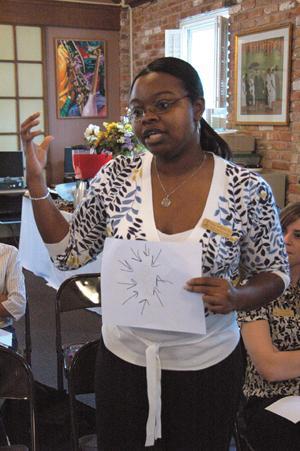The Safe Space Campaign hosted an LSUnity program Tuesday that addressed discrimination against minority lesbian, gay, bisexual and transgender people.
Candace Creecy, Safe Space coordinator, and Jason Meier, Union assistant director, led the program titled “Diversity in Discrimination: A Cross-Cultural Analysis of Sexual Orientation” at the African American Cultural Center.
Creecy and Meier told the program’s attendees about “multiple identities,” the various roles people have in their lifetime including gender, profession and race.
“They’re all parts of who you are and what make you who you are,” said Meier, who is the Gays, Bisexuals, Lesbians, Supporters United adviser. “And unfortunately, they’re all reasons why you can be discriminated against.”
Meier said there is a small minority presence in student organizations, but there are many LGBT leaders on campus.
“The LGBT community has made an impact on campus, just not necessarily through LGBT student organizations,” he said.
Creecy said the “coming-out” experience is different for everyone, especially minorities.
Creecy said some black, Latin-American and Asian-American LGBT individuals feel marginalized.
Creecy said many predominately black churches have strong views against homosexuality. She said Latin Americans and Asian Americans face cultural variances within their races.
“Many face language barriers, which make access to resources and support difficult,” she said.
Andre Monte, English senior, and Stephan Taylor, communication studies junior, served on the question-and-answer panel.
Monte said he did not come out until he enrolled at the University. He said he had an “at-home feeling” when he saw LGBT students supporting each other on campus.
The panelists also discussed the Catholic church’s stand on homosexuality, the minority LGBT presence on campus and how machoism is portrayed in their families.
Monte said marrying a woman and having kids is considered the masculine thing to do in his Filipino family.
“That was always drilled into my head,” he said.
Taylor said he notices some discrimination when he goes out with his friends. He said white people are usually on one side of the club while black people are on the other.
Taylor said people may lack in communication about discrimination because of cultural differences.
“Some people haven’t been exposed to that and haven’t had to mix with other people,” he said.
Creecy said the program was successful.
“[The panelists] brought up some good points,” she said. “Seeing their faces and hearing their stories was important. They showed that, even within so many racial minorities, there’s different experiences.”
—–Contact Angelle Barbazon at abarbazon@lsureveille.com
LSUnity hosts program addressing gay minorities
March 14, 2007

Hope Mcphatter, Wellness Education Coordinator of the Student Health Center, explains a drawing she made depicting descrimination. This week is LSUnity week and will be marked with programs promoting understanding among different groups at LSU.



